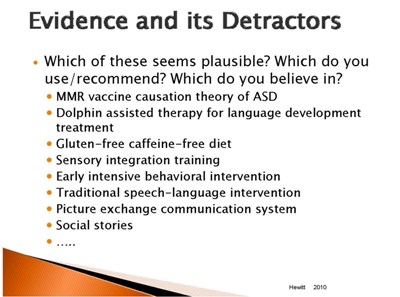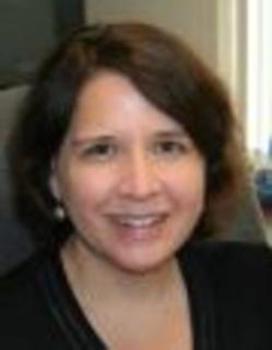This text-based course is a written transcript of the course, “Treatment Efficacy and Autism Spectrum Disorder”, presented on March 31, 2011 by Lynne Hewitt.
This text is being provided in a rough draft format. Communication access realtime translation (cart) is provided in order to facilitate communication accessibility and may not be totally verbatim. The speaker was speaking over 340 words per minute. Consumer should check with the moderator for any clarifications of the material.
Click Here to View Supplemental Handouts
>> Amy Hansen: Welcome to today's expert e-seminar entitled “Treatment Efficacy and Autism Spectrum Disorders” presented by Dr. Lynne Hewitt. Lynne Hewitt is Associate Professor and Chair of the Department of Communication Disorders at Bowling Green State University. She is a licensed and certified speech language pathologist and researcher. Her primary research interests include language and communication in autism spectrum disorders, intervention for developmental language disorders, pragmatics and assessment. She has served as an Associate Editor of the journal, Language, Speech and Hearing Services in the Schools and is Division Coordinator for Special Interest Division 1 of the American Speech-Language Hearing Association, Language, Learning and Education. She was topic coordinator for autism for the ASHA annual meeting in 2009. In 2008 she was an Erskine Fellow at the University of Canterbury, New Zealand, where she taught an upper division seminar on autism. Dr. Hewitt frequently presents at national and international meetings on topics related to her research and clinical interests. So welcome, Dr. Hewitt. Thank you so much for sharing your expertise with us today.
>> Dr. Hewitt: Well, thank you very much for that introduction. That's very kind and I'm very delighted to be here today to talk about a topic that's near and dear to my heart, which is providing the very best treatment that we can for children and adults with autism spectrum disorders. Today we're going to focus more on children than adults, and do that in a way that is really based in the science.
Evidence and its Detractors
I'd like to just start out today by talking a little bit about how research takes place and how it's very difficult to have the evidence that we need for a lot of things, and that there are so many ideas out there. On my very first slide here I'm just going to pick one at random.

How many of you have heard of dolphin assisted therapy? Some of you have heard of dolphin therapy. Some folks haven't heard of it. How many think that it is a plausible treatment for language development in autism? Most people are putting thumbs down on this. It seems like the majority of voters here are feeling that dolphin therapy, in and of itself, may have some benefit or may not, but perhaps is not an appropriate treatment for language development. There's other things on this list that are obviously a lot more near and dear to our hearts and more likely to be engaged in by more speech language pathologists, such as our traditional approaches that we have used for language development in other populations: Picture Exchange Communication System, Social Stories. We're going to talk a little bit about some of those today.

